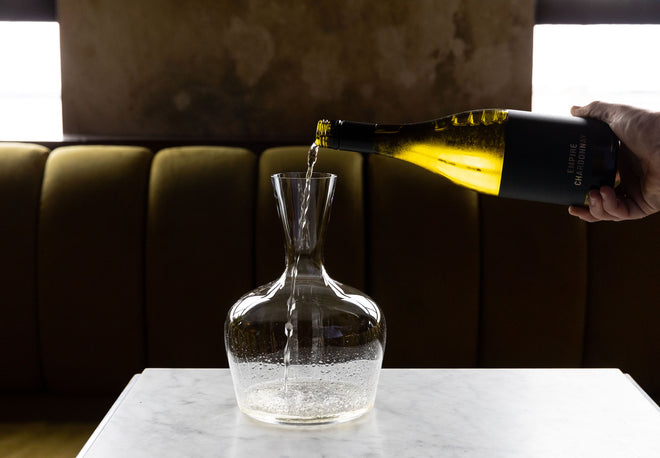
01/10/19
The Wine Decanting Guide with Jancis Robinson
It goes without saying, there is often much thought that goes into serving wine when hosting a dinner party. Thankfully, Jancis Robinson and Hugh Johnson talk us through the ritual of decanting wine: why, when and how, so you can rest assured you've at least got this aspect thoroughly covered.
"Wine is about human relations, hospitality, rivalry, bonding, ritual... the more thought goes into the process of sharing, the more pleasure it can give." Jancis Robinson
It goes without saying, there is often much thought that goes into serving wine when hosting, whether you're planning a flamboyant six course dinner party or a casual Friday supper with close friends. From food pairings, the right number of bottles, wine temperature, and the order in which you are planning on serving them, there is a plethora of exciting elements to consider when prepping the perfect glasses of wine.
Thankfully, Jancis Robinson and Hugh Johnson, in The World Atlas of Wine, Eighth Edition, talk us through the ritual of decanting wine: why, when and how, so you can rest assured you've at least got this aspect thoroughly covered.

Why and When?
Historically, the main reason you would decant a bottle of wine is to separate the sediment and avoid unappetising mouthfuls of deposit in your glass. However, "experience shows that it is usually young wines that benefit most", as the oxygen they contain hasn't had very long to take full effect on the wine. With this in mind, aerating a young wine in the decanter can sometimes give an illusion of more maturity.
Depending on the the strength of the wine, they can benefit from anything from 2 to 24 hours in a decanter prior to serving, and more importantly, enjoying.
We like to follow Jancis' rule of thumb: young, tannic, alcoholic wines need, and can withstand, much earlier decanting than older, lighter bodied wines. Full white wines such as White Burgundies or Rhônes can benefit from decanting, too - and will often look even more beguiling in a decanter than reds.

How?
Should you choose a bottle that contains sediment, you'd want to leave plenty of time for this to sink to the bottom of the bottle; we'd recommend you let this sit upright for a day or two. With these wines, when removing the cork, keep the bottle as still as possible so as not to disrupt the sunken sediment.

Open the bottle and pour the wine steadily into the decanter; ideally holding a candle to the bottleneck so you can easily spot the sediment moving into the lower neck of the bottle before it accidentally drips into your decanter.
For younger wines, those that need some added aeration to fully develop, using a decanter with a wide neck and ample room for swirling is ideal. Jancis describes the desired movement as to "splash" the wine as much as possible, we'll be quick to warn that too much enthusiasm is ill advised!
Choosing the Perfect Decanter
There are two distinct shapes that typically used for old and young wines respectively. Old wines benefit from decanters with minimal headspace to avoid being exposed to too much harmful oxygen that can damage the length and aroma of a wine. Our Mature Wine Decanter is ideal for this and a favourite of winemakers around the world.

Sophie Parker-Thomson MW, New Zealand's third female Master of Wine and head winemaker at Blank Canvas, uses our Mature Wine Decanter almost every night, describing it as "a really functional, practical decanter that gets a lot of use in our household".
For young wines, you are looking for a decanter that allows for maximum aeration. Our Young Wine Decanter has been designed with a long neck to give ample space to swirl the wine energetically, encouraging the oxygen to hasten the young wine's evolution and mellow the flavours.

For a detailed decanter explanation from Jancis, please see the video below.
Click here to find out more about our Jancis Robinson Collection.














































